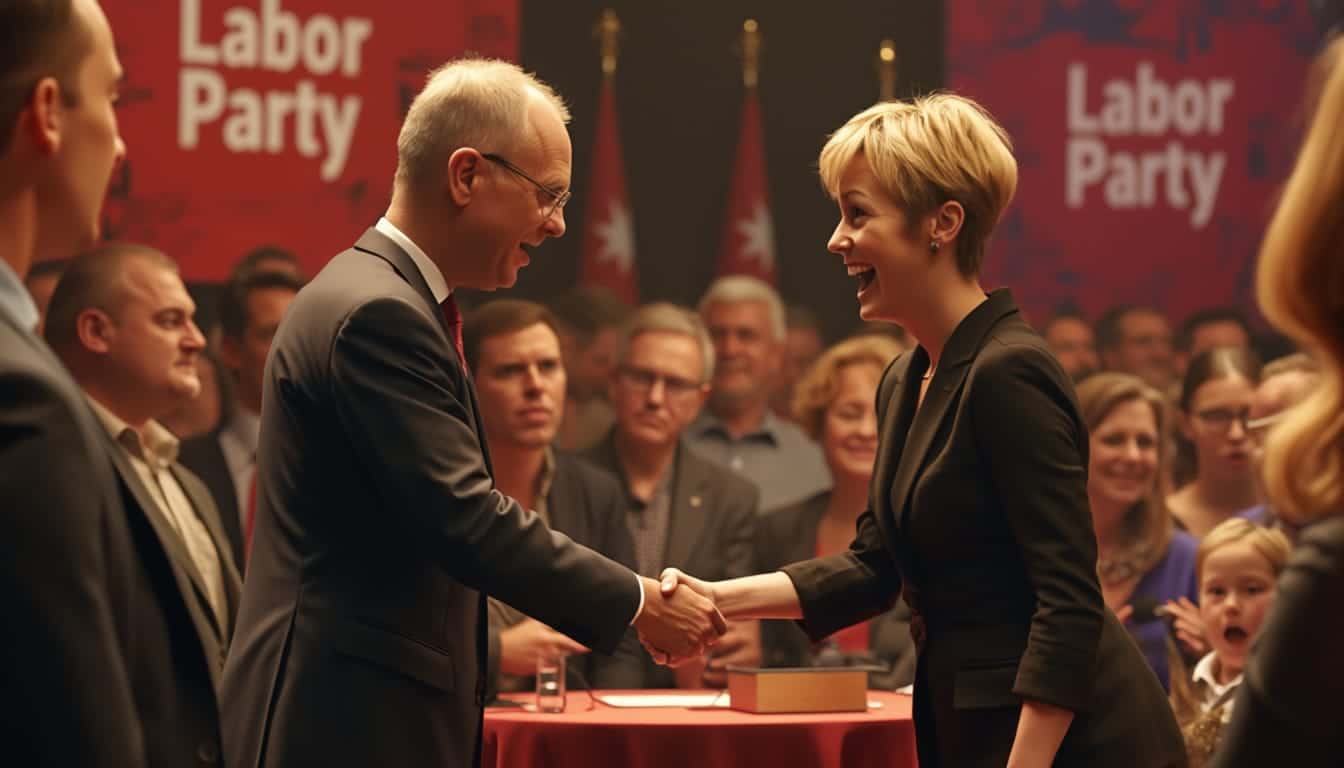At the launch of the federal campaign for the Labor Party on Sunday, an unexpected moment captivated the attention of the spectators.
Anthony Albanese and Tanya Plibersek shared an exchange that sparked numerous discussions.
As Albanese welcomed members of his parliamentary team, the atmosphere seemed cordial. Jim Chalmers greeted the Prime Minister with a pat on the back, while former Prime Minister Julia Gillard was satisfied with a handshake. However, it was the interaction between Albanese and Plibersek that really drew attention. When she tried to warmly embrace him, Albanese gently blocked her hands, avoiding any closer contact.
This gesture immediately sparked speculation about the nature of their professional relationship. Plibersek, after the incident, suggested that Albanese’s decision might have been motivated by health precautions, emphasizing the importance of protective measures during an election campaign. Despite this episode, the two politicians stated that they maintain good relations, highlighting their collaboration within the left faction of Labor.
Recent tensions within the party, particularly concerning Plibersek’s proposals regarding the environmental protection agency, have cast a shadow over this meeting. Albanese admitted that he values their long-standing friendship, while stressing the importance of Plibersek’s work in his portfolio. This complex dynamic reflects the internal challenges the party leadership must face to maintain unity in the face of electoral issues.
As the campaign progresses, these interactions could influence voters’ perceptions of the cohesion and solidity of Labor’s leadership. The future will tell whether these moments of tension will resolve or if they will permanently mark relationships within the party.

Table of Contents
Togglean awkward moment at the launch of the election campaign
During the launch of the election campaign for the Labor Party, an unexpected scene drew the attention of the media and the public. Tanya Plibersek, Minister for the Environment, attempted to welcome Anthony Albanese, the future Prime Minister, with a warm greeting that included a hug and a kiss. However, Albanese quickly interrupted this gesture by blocking her hands, insisting that they are good friends. This exchange sparked speculation about the internal dynamics of the party and the reasons behind this reaction.
This incident did not occur in a vacuum. Indeed, the relationship between Plibersek and Albanese has been marked by several moments of tension, especially during crucial legislative negotiations for the party. The apparent refusal of a hug during the election campaign was perceived by some as a sign of disagreement or growing distance between the two leaders. However, subsequent explanations attempted to place this event in a more nuanced context.
Tanya Plibersek’s explanations
Following the incident, Tanya Plibersek spoke on a morning show to clarify the situation. She suggested that Albanese’s decision not to accept the hug was motivated by a desire to protect himself from potential infections, particularly in the current context where health concerns remain high. Plibersek admitted that she should have opted for an elbow bump, a safer and socially acceptable alternative in the current climate.
“I think we should all still be elbowing each other,” she stated on the Sunrise show. This remark not only underscores the caution during the campaign but also acknowledges the need to adapt greeting gestures for public health reasons. Plibersek also affirmed that despite this incident, she and Albanese still have a good relationship, answering affirmatively to the question of whether they are still “buddies.”
This clarification likely aimed to ease tensions and prevent this incident from being romanticized as a sign of a rift within the party. By emphasizing the health dimension of Albanese’s action, Plibersek sought to reposition the situation as a misunderstanding rather than as a symptom of deep disagreement.
Anthony Albanese’s reaction
For his part, Anthony Albanese also addressed the incident during a subsequent interview. He emphasized the importance of his relationship with Plibersek, describing her as a “good friend” and highlighting their past collaboration within the party. Albanese explained that their professional relationship has been marked by moments of political disagreements, but he insisted that these differences do not undermine their personal friendship.
When asked whether he planned to keep Plibersek in her ministerial portfolio in the event of an electoral victory, Albanese confidently replied: “Tanya Plibersek has been a long-time friend. We are good friends, and she does a fantastic job.” This statement aims to reassure party members and the public about the maintenance of internal cohesion despite the appearance of an awkward interaction.
Albanese also addressed the challenges the party faces, particularly regarding the establishment of a new environmental protection agency. He acknowledged that disagreements over legislation may have created friction but reiterated his commitment to constructive collaboration within the party. This statement helped to ease tensions and reposition the incident within the framework of a strong professional relationship despite the hurdles encountered.
internal tensions within the Labor Party
The incident between Plibersek and Albanese is not an isolated event but rather a reflection of broader tensions within the Labor Party. Indeed, the two leaders have recently been at the center of discussions concerning political and strategic differences, particularly around the creation of a new environmental protection agency. The disagreement over this legislative project, which also involves the Greens and independent Senator David Pocock, has exacerbated tensions within the party.
These differences illustrate the challenges the party faces in seeking a coherent and unified political line. The ability of Plibersek and Albanese to navigate these disagreements while maintaining an effective working relationship is crucial for the party’s future. Past disagreements, particularly Albanese’s promise to present a new agency in the event of an electoral victory, show a willingness to find compromises and address the concerns of members and voters.
Moreover, the perceived rivalry between the two leaders may have implications for the party’s leadership. Plibersek, a former deputy leader of the party, has been associated with the left faction, while Albanese, although also belonging to this faction, has occasionally taken positions that place him as a pragmatic leader seeking to broaden the party’s appeal. These internal dynamics are essential for understanding the stakes surrounding their recent public interaction.
the impacts on the electoral campaign
The episode between Plibersek and Albanese occurs at a critical moment in the electoral campaign, where every gesture and interaction can have significant repercussions on voters’ perceptions. An awkward greeting, though minor in appearance, can be interpreted as a sign of internal divisions or lack of harmony within the party. This could potentially influence voter confidence in the party’s ability to govern in a united and effective manner.
However, the explanations provided by both leaders aim to minimize this impact. By emphasizing practical rather than personal reasons for the interruption of the hug, they seek to preserve the image of a united team focused on common goals. Transparency and proactive communication are key strategies to counter any negative interpretation of this incident.
Furthermore, the emphasis on collaboration and mutual respect between Plibersek and Albanese may reinforce the image of an inclusive leadership capable of managing differences constructively. This is particularly important during an electoral period where voters are looking for leaders able to navigate complex challenges while maintaining unity and cohesion.
the choice of an alternative greeting: why the elbow bump?
The incident highlighted the importance of appropriate greeting gestures in the current context. The choice to favor an elbow bump rather than a hug or handshake has become a common practice to minimize the risks of disease transmission, especially in public settings and during mass events such as the launches of electoral campaigns.
Adopting the elbow bump has several advantages. On one hand, it allows for maintaining eye contact and a certain closeness without compromising social distancing measures. On the other hand, this gesture can be perceived as modern and respectful of health concerns, thereby enhancing the image of aware and responsible leaders.
In the case of Plibersek and Albanese, the choice between a hug and an elbow bump was not merely a matter of personal preference but also a strategic decision aimed at communicating caution and responsibility. By perhaps opting for a less intimate gesture, Albanese aimed to demonstrate his commitment to public health while preserving a respectful professional relationship with Plibersek.
In the future, it is likely that such practices will continue to gain popularity, not only in the political context but also in other spheres of public life. The evolution of social norms regarding public health has redefined how human interactions are perceived and executed, highlighting the importance of adapting daily gestures to contemporary health realities.
En Allemagne, top départ d'une campagne électorale hors-norme https://t.co/wGTqlBVoaw
— Les Echos (@LesEchos) January 6, 2025
Articles similaires
Thank you!
We will contact you soon.














